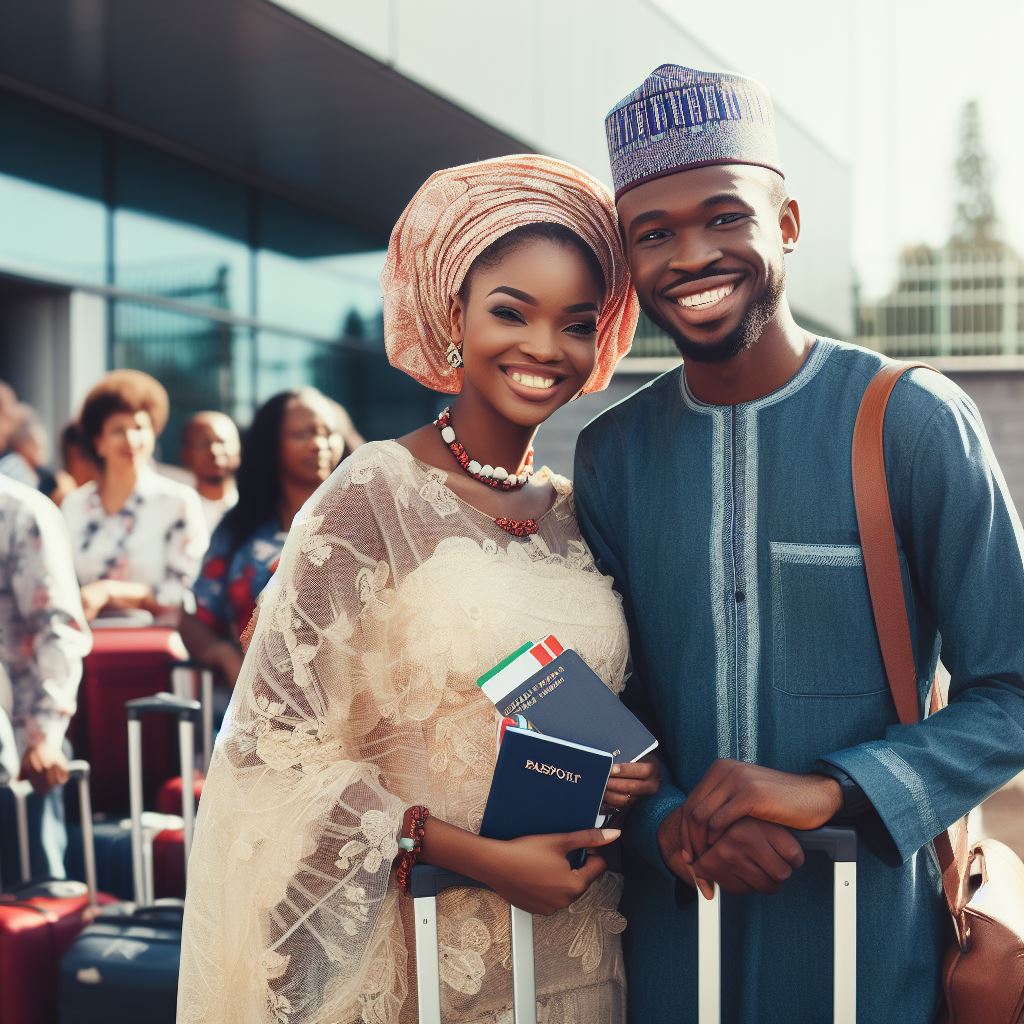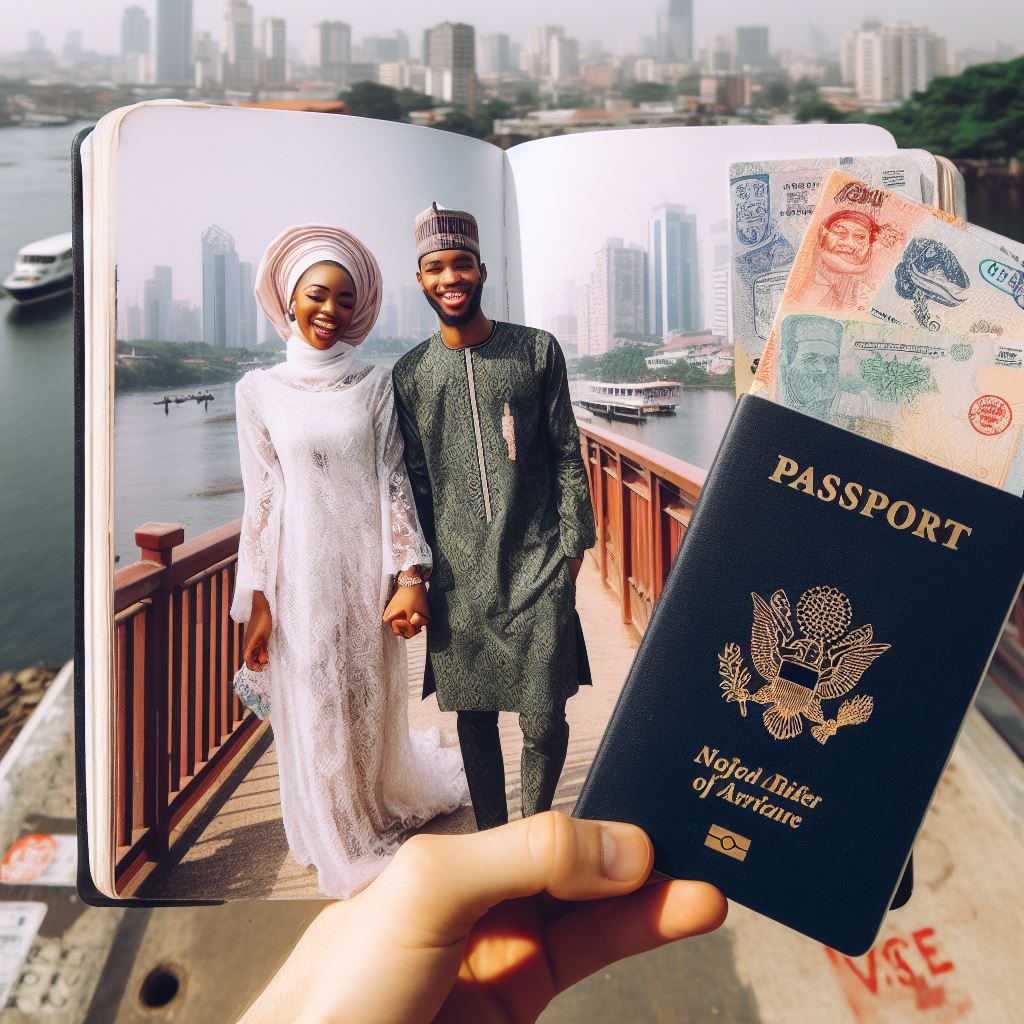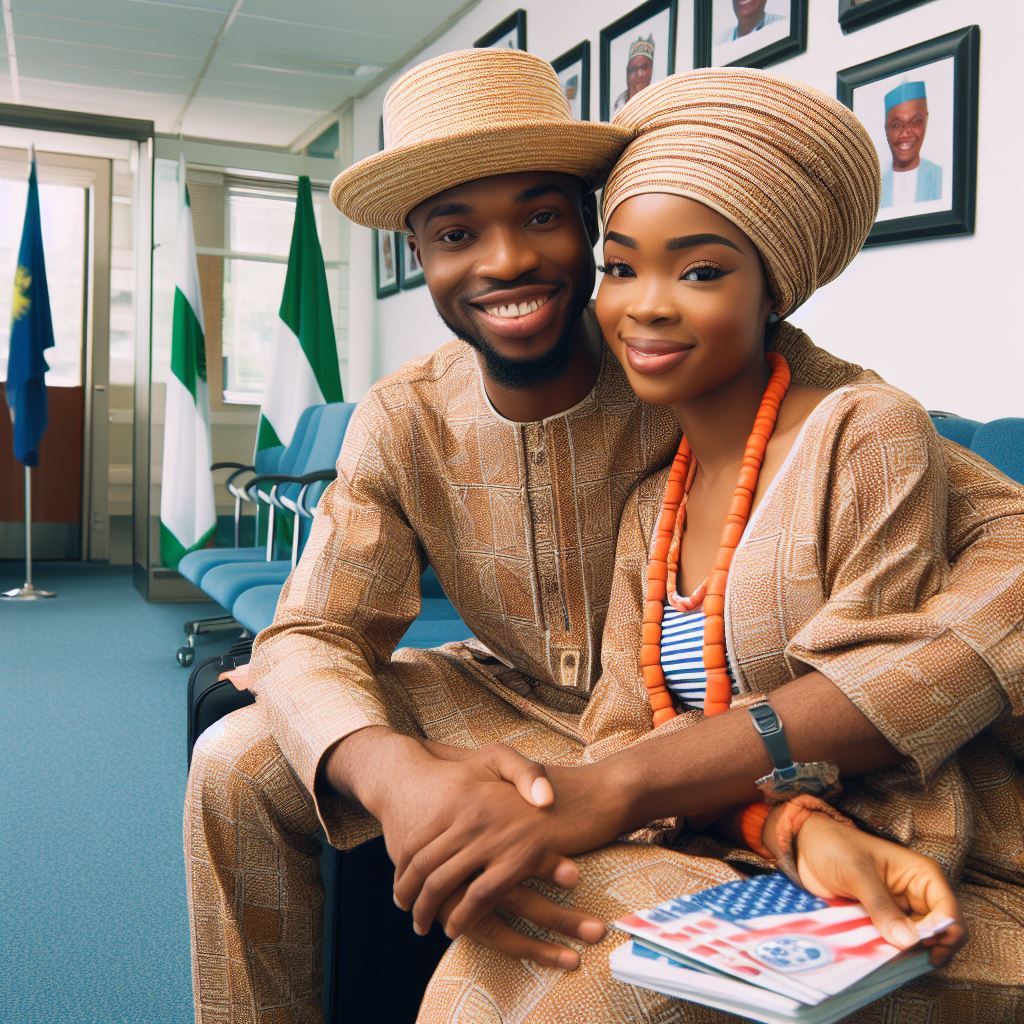Introduction
Let’s explore pros & cons of marriage-based citizenship in Nigeria.
Marriage-based citizenship refers to the process through which an individual acquires citizenship in a country by virtue of being married to a citizen of that country.
In Nigeria, marriage-based citizenship is governed by the Nigerian Marriage Act of 1990, which outlines the requirements and procedures for obtaining citizenship through marriage.
Marriage-based citizenship is a significant avenue through which individuals seek legal recognition and privileges in a foreign country, often tying together personal and legal commitments.
In the context of Nigeria, a nation renowned for its rich cultural tapestry and diverse demographic, this pathway to citizenship holds both promises and challenges.
This comprehensive exploration aims to dissect the advantages and disadvantages of marriage-based citizenship in Nigeria, shedding light on the complexities and considerations that surround this pivotal life decision.
By delving into the nuanced facets of this process, individuals and policymakers alike can gain a deeper understanding of its implications on personal lives and the broader socio-political landscape.
Pros of marriage-based citizenship in Nigeria
Provides a legal status for foreign spouses
- Marriage-based citizenship in Nigeria offers foreign spouses a legal status in the country.
- Having a legal status allows foreign spouses to live, work, and own property in Nigeria.
- It provides them with a sense of security and protection under Nigerian laws.
- Foreign spouses can freely travel in and out of Nigeria without the fear of deportation.
- They can also access healthcare services and other benefits available to Nigerian citizens.
Opens up opportunities for employment and education
- Marriage-based citizenship enables foreign spouses to seek employment in Nigeria.
- They can contribute to the country’s economy and fill skill gaps in various industries.
- Foreign spouses can access education and training opportunities in Nigerian institutions.
- They can pursue higher education degrees and gain valuable knowledge and skills.
- This can enhance their career prospects and lead to a better quality of life.
Facilitates social integration and cultural exchange
- Marriage-based citizenship promotes social integration between Nigerians and foreign spouses.
- It encourages cultural exchange, fostering understanding and tolerance among different communities.
- Foreign spouses can learn about Nigerian culture, traditions, and values.
- They can share their own cultural heritage and contribute to the diversity of Nigerian society.
- This creates a rich and vibrant multicultural environment for everyone.
Enhances family reunification
- Marriage-based citizenship in Nigeria facilitates the reunification of families.
- Foreign spouses can live with their Nigerian partners and build a life together.
- They can create a stable and loving environment for their children.
- Family bonds are strengthened, and emotional well-being is improved.
- Children can grow up with both parents, fostering a strong sense of belonging and identity.
In short, marriage-based citizenship in Nigeria brings numerous benefits for foreign spouses.
It also promotes social integration and cultural exchange, creating a diverse and inclusive society.
Cons of marriage-based citizenship in Nigeria
Possibility of fraudulent marriages
- Fraudulent marriages, entered solely for the purpose of gaining citizenship, are a concern.
- Criminals may exploit this avenue to evade immigration laws and gain legal status through fraudulent marriages.
- The lack of stringent screening processes can lead to an increase in sham marriages.
Financial burden on the sponsoring spouse
- The sponsoring spouse takes on significant financial responsibility during the immigration process.
- They must provide financial support, including accommodation, healthcare, and daily expenses, for the foreign spouse.
- This financial burden can strain the sponsoring spouse’s resources and affect their own financial stability.
Limited rights and benefits for foreign spouses
- Foreign spouses, even after obtaining citizenship, may face limitations in certain rights and benefits.
- They might not have the same access to social security, healthcare, and other public services as native citizens.
- These limitations can create inequality and hinder the integration of foreign spouses into society.
Potential for abuse and exploitation
- Foreign spouses in marriage-based citizenship may become vulnerable to abuse and exploitation.
- They might be coerced or mistreated by their sponsoring spouse, who holds power over their immigration status.
- This power imbalance can lead to an environment of abuse, threatening the well-being and safety of the foreign spouse.
In fact, marriage-based citizenship in Nigeria has its drawbacks.
The possibility of fraudulent marriages remains a concern, and the lack of stringent screening processes can lead to an increase in sham marriages.
The sponsoring spouse may face a significant financial burden, straining their own resources.
Foreign spouses may also face limitations in their rights and benefits, hindering their integration into society.
The power imbalance between the sponsoring spouse and the foreign spouse can result in abuse and exploitation.
These cons should be carefully considered when evaluating the effectiveness and fairness of marriage-based citizenship in Nigeria.
Read: Navigating Nigeria: Marriage Citizenship Laws Explained
Controversies surrounding marriage-based citizenship in Nigeria
Discussions on inequality and discrimination
Marriage-based citizenship policies can perpetuate inequality among Nigerian citizens.
It creates a hierarchy where those who marry foreigners are granted more privileges.
Some argue that granting citizenship based on marriage violates the principle of equal opportunities.
It can lead to discrimination against individuals who are not in a marital relationship.
People who are single or have same-sex partners may feel marginalized by these policies.
Debates on strict immigration policies and regulations
- Advocates of strict immigration policies argue that marriage-based citizenship can be exploited.
- It is considered a way for foreigners to gain citizenship without fulfilling other legal requirements.
- Opponents claim that these policies undermine the integrity of the immigration system.
- There are concerns that insufficient background checks may lead to security risks.
- Debates revolve around finding a balance between securing the nation and promoting fairness.
Concerns about cultural assimilation and identity loss
Some fear that marriage-based citizenship can result in a loss of cultural identity.
- Foreign spouses may influence the Nigerian partner to adopt their cultural practices over their own.
- It raises questions about preserving Nigerian traditions and cultural heritage.
- There is a need to ensure that marriage-based citizenship does not erode the Nigerian identity.
- Debates center around how to promote integration without compromising cultural diversity.
The controversies surrounding marriage-based citizenship in Nigeria touch upon issues of inequality, discrimination, immigration policies, cultural assimilation, and identity loss.
Critics argue that granting citizenship based on marriage perpetuates inequality among citizens and may lead to discrimination against singles or those with same-sex partners.
The debates on strict immigration policies highlight concerns about the potential exploitation of marriage-based citizenship as a shortcut to gaining citizenship.
Opponents argue that this undermines the integrity of the immigration system and may pose security risks.
Concerns about cultural assimilation and identity loss arise, as some fear that foreign spouses may influence Nigerian partners to abandon their own cultural practices.
It is vital to strike a balance that ensures fair immigration practices, preserves cultural heritage, and maintains a strong Nigerian identity.
Read: The Art of Compromise: Key for Successful Nigerian Marriages

Case Studies and Anecdotes
Case studies and anecdotes are essential in understanding the pros and cons of marriage-based citizenship in Nigeria.
By examining success stories, we gain valuable insights into the positive outcomes that can be achieved through this process.
Highlighting success stories of marriage-based citizenship
Mr. and Mrs. Adekunle’s story serves as a great example of a successful marriage-based citizenship application.
Being a foreigner, Mrs. Adekunle faced numerous challenges trying to obtain Nigerian citizenship.
However, after marrying Mr. Adekunle, who was a Nigerian citizen, she was able to complete the necessary paperwork and become a Nigerian citizen herself.
Their story showcases how marriage can be an effective pathway to citizenship.
Similarly, Sarah’s experience sheds light on the benefits of marriage-based citizenship.
Although Sarah initially struggled with the language and cultural differences, her Nigerian husband and his family provided a strong support system that helped her integrate into Nigerian society.
Through their marriage, Sarah gained a sense of belonging and identity in Nigeria.
Another interesting case is that of John and Blessing, a couple with different nationalities.
They decided to settle in Nigeria and raise their family there.
Although the citizenship application process was complex and lengthy, they persevered and eventually obtained Nigerian citizenship.
Their story demonstrates that marriage-based citizenship can be a viable option for couples seeking a new start in a different country.
Sharing experiences of challenges faced by individuals
On the other hand, it is important to acknowledge the challenges faced by individuals pursuing marriage-based citizenship.
Bureaucratic hurdles often make the application process frustrating and time-consuming for couples.
The complex paperwork, long waiting periods, and multiple interviews can be overwhelming and discouraging.
The emotional strain of adjusting to a new culture and language can also be a major challenge.
Many individuals marrying foreign nationals experience a sense of displacement and a loss of their own cultural identity.
Adapting to a new way of life can be lonely and isolating, leading to feelings of homesickness and nostalgia.
Furthermore, the financial aspect should not be overlooked.
The cost of the citizenship application process, including legal fees and document translation, can be significant.
This financial burden may limit the accessibility of marriage-based citizenship to certain individuals or couples with limited resources.
In essence, case studies and anecdotes provide valuable insights into the pros and cons of marriage-based citizenship in Nigeria.
Success stories highlight the positive outcomes that can be achieved, such as obtaining citizenship and integrating into a new society.
On the other hand, challenges faced by individuals, including bureaucratic hurdles, emotional strain, and financial difficulties, should not be overlooked.
Understanding both the benefits and drawbacks of marriage-based citizenship is crucial in shaping policies and facilitating a smoother process for individuals seeking citizenship through marriage.
Read: How Parenting Shapes Marital Dynamics in Nigeria
Recommendations for improving the marriage-based citizenship process in Nigeria
Strengthening immigration processes and screenings
- Establish stricter guidelines for verifying the authenticity of marriage certificates and documents.
- Implement comprehensive background checks on both the Nigerian citizen and the foreign spouse.
- Enhance the training of immigration officers to identify potential cases of marriage fraud.
- Collaborate with international agencies to share information and improve intelligence gathering.
- Upgrade technological systems to facilitate efficient and accurate processing of citizenship applications.
Increasing support and protection for foreign spouses
- Create dedicated support centers to provide guidance and assistance to foreign spouses throughout the citizenship application process.
- Establish legal aid resources and counseling services specifically tailored for foreign spouses.
- Develop programs that promote cultural integration and facilitate the adjustment process for foreign spouses.
- Ensure the availability of translators and interpreters to assist foreign spouses during interviews and proceedings.
- Implement measures to protect foreign spouses from exploitation or abuse, including establishing reporting mechanisms.
Promoting public awareness and education about the benefits and drawbacks
- Launch nationwide campaigns to educate Nigerians about the advantages and challenges of marriage-based citizenship.
- Encourage open discussions and public forums to address common misconceptions and concerns regarding foreign spouses.
- Collaborate with media outlets to disseminate accurate and balanced information about marriage-based citizenship.
- Develop educational materials, such as brochures and videos, to provide in-depth information about the process.
- Involve community leaders and organizations to actively promote understanding and acceptance of foreign spouses.
In general, improving the marriage-based citizenship process in Nigeria requires a comprehensive approach.
Strengthening immigration processes, providing support and protection for foreign spouses, and promoting public awareness are crucial steps towards achieving a more efficient and fair system.
By implementing these recommendations, Nigeria can strive towards a citizenship process that ensures the integrity of marriages and upholds the rights of both Nigerian citizens and foreign spouses.
Read: Modern Love: Changing Perspectives on Marriage in Nigeria
Conclusion
In this section, we have explored the pros and cons of marriage-based citizenship in Nigeria.
On the positive side, marriage-based citizenship can provide opportunities for foreign spouses to legally reside and work in Nigeria.
It promotes family unity and allows couples to build a life together in the country.
It facilitates cultural exchange and integration between different nationalities.
However, there are also certain drawbacks to consider.
Marriage-based citizenship can be susceptible to fraud and sham marriages, where individuals marry solely for the purpose of obtaining citizenship.
This poses a threat to national security and undermines the integrity of the immigration system.
Furthermore, foreign spouses may face challenges such as discrimination, language barriers, and difficulty in finding employment.
Despite the challenges, marriage-based citizenship plays a crucial role in promoting inclusivity and diversity in Nigeria.
It is important to maintain a balance between providing opportunities for genuine couples while effectively addressing issues related to fraud.
Stricter regulations and thorough screening processes can help to ensure the legitimacy of marriages and protect the interests and security of the nation.
Marriage-based citizenship contributes to the social, cultural, and economic development of Nigeria.
It strengthens family ties, fosters intercultural understanding, and enhances the country’s global image.
The government should continue to evaluate and improve its policies in this area to create a fair and efficient system that benefits both Nigerian citizens and foreign spouses.




